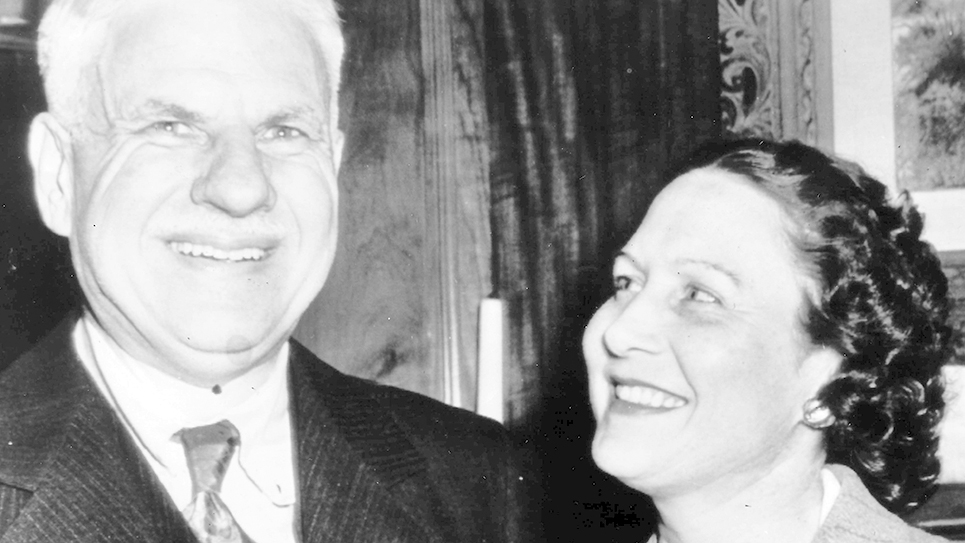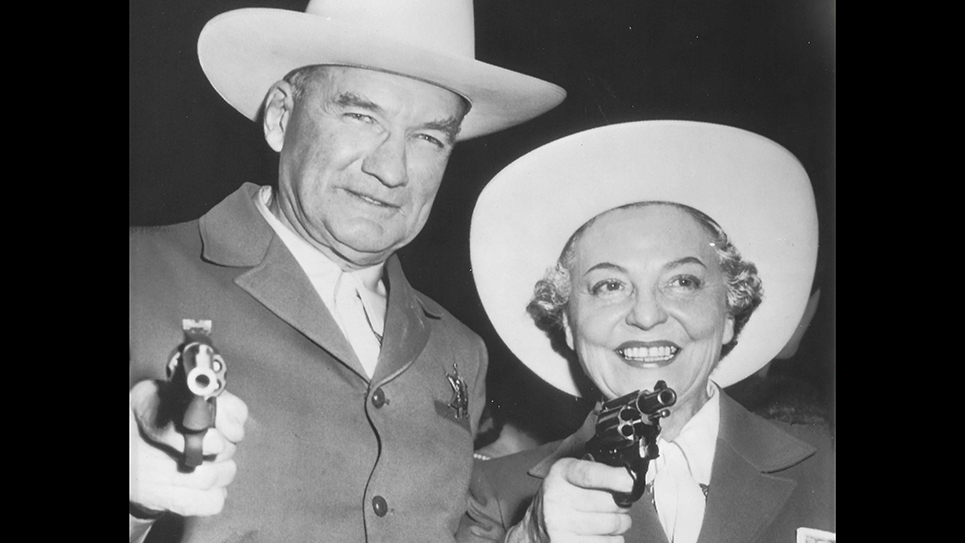James P. Kem of Missouri
By Ray Hill
The election of 1946 carried numerous Republican candidates into Congress on a tidal wave of dissatisfaction with war-time regulations still in place following the Second World War. No loss was as personally galling to President Harry Truman as that of Frank P. Briggs in Missouri. When Truman was elected to the vice presidency in 1944, he resigned his seat in the United States Senate in January of 1945. Missouri Governor Phil Donnelly appointed Briggs to fill the vacancy caused by Truman’s resignation on January 18, 1945. Briggs was, of course, a Democrat like Harry Truman. Frank Briggs was from Macon, Missouri, and by profession was a country editor. Briggs was the owner, publisher and editor of the Macon Chronicle–Herald. Briggs was also involved in local politics, having been the mayor of Macon for a short spell and a decade in Missouri’s State Senate.
James Preston Kem was a white-haired, mustachioed prosperous lawyer from Kansas City, although he had been born in Macon, Missouri. Kem specialized in corporate law and was by all accounts an excellent attorney. Kem dabbled in politics and had a reasonably high profile locally, serving as the head of the association of attorneys in Kansas City, as well as the chairing the Jackson County Republican Party.
Kem began to methodically build up support to run for the United States Senate, traveling the highways and byways of the many more rural counties in Missouri. James P. Kem faced four opponents inside the GOP primary for the senatorial nomination, including a former congressman and a state senator. Kem swept past his opponents in the Republican primary to win the right to face Senator Briggs in the general election, winning over 54% of the ballots cast.
TIME magazine, the premier news magazine of its day and read by millions, thought a GOP swell was building in the Show Me State and unless the wobbly Pendergast machine that had birthed Harry Truman and the comparable Democratic machine in St. Louis could produce enough votes to stave it off, Kem might very well win. Briggs campaigned on support for Truman while Kem deftly played upon the dissatisfaction of so many voters. Described by TIME as “neat, conservative, colorless,” Kem hit the Democrats over price controls and criticized “left wingers” and the Democratic big city political machines.
The GOP tide was indeed rising and Kem beat Senator Briggs decisively on Election Day. While Briggs carried Kem’s home county of Jackson (Kansas City), he only barely won by little more than 3,000 votes. The other big machine in St. Louis failed to perform at all, as James P. Kem won the City of St. Louis by just under 6,000 ballots. Kem beat the dickens out of Briggs in St. Louis County, winning quite nearly 67%. When all the returns were in, Kem had won by more than 60,000 votes. Two years previously, Forrest C. Donnell, then governor, won Democrat Bennett Champ Clark’s seat by defeating state Attorney General Roy McKittrick by exactly 1,900 votes. To the chagrin and humiliation of Harry Truman, Missouri had two Republican United States senators.
Once in the Senate, James P. Kem proved to be one of the more conservative members of that body. A caustic critic of the political machines in his home state, Senator Kem was also a persistent critic and opponent of President Harry Truman. Kem routinely opposed much of the Truman Administration’s agenda. Senator Kem’s hostility to Truman’s foreign policy caused his own political opponents to label him an isolationist. TIME, owned by Republican Henry Luce, took a staunchly internationalist line and the news magazine rarely failed to miss any opportunity to remind readers the Missouri U.S. senator was an isolationist. The description isn’t entirely accurate, as Senator Kem was highly skeptical of spending on foreign aid, oftentimes considering it a waste of taxpayer money. It was more apt to describe James P. Kem as one of those senators who questioned spending programs, demanding to know precisely what good it did Americans.
Kem was one of those senators who gathered at the antique-filled parlor of Senator Clyde Reed of Kansas at the stately Stoneleigh Court, a handsome apartment house much favored by Washington’s ruling class. Reed answered the door and immediately told his colleagues, “Now boys, this isn’t a drinking party.” The purpose of the meeting was to consider a program to counter the proposal being offered by Michigan’s Arthur Vandenberg, who received considerable positive attention from the new media of the day as he was a formerly bitter isolationist who had seen the light and become an internationalist in his foreign policy outlook. While the GOP was in control of the Congress from 1947-1949, Arthur Vandenberg replaced Tom Connally of Texas as chairman of the prestigious Senate Foreign Relations Committee. Vandenberg was one of the progenitors of the “bipartisan foreign policy” in the United States Senate. The Senate was considering a European Recovery Plan, which was hoped would rebuild war-torn Europe following the devastation wrought by the Second World War and stave off the march of Communism.
Kem, along with colleagues such as John W. Bricker of Ohio, C. Wayland “Curly” Brooks of Illinois, Majority Whip Kenneth Wherry of Nebraska, and sixteen other senators came to Senator Reed’s spacious living room to discuss strategy. Many of those attending discussed what came to be known as the “Marshall Plan,” named for the former general and secretary of state. Many senators were distrustful of the State Department controlling the distribution of the massive financial aid the plan would spend in Europe. Even Arthur Vandenberg thought the Truman Administration would have to accept some significant changes to the plan if the Senate was going to approve it.
The media of the day was very much in favor of the Marshall Plan. Congressman Max Schwabe of Missouri pointed out that of 145 speakers given airtime by the radio networks, 120 were in favor of approving the plan, while less than 20 had been against it. “The conclusion is inescapable, that the American people have been permitted to hear only one side of the proposal during most of the time they are listening to the radio,” the congressman huffed.
American farmers were mostly in favor of the Marshall Plan, as much of the spending would go to feed the hungry Europeans, giving them a bigger market for their crops.
Much of the opposition to the Marshall Plan and spending $5 billion of American taxpayers’ money came from the Midwest. Bennett Champ Clark had been one of the more vehement opponents of internationalism while in the Senate. James P. Kem remained opposed to the program from the beginning until the end, describing it as a wasteful “rathole.”
Senator Kem’s constant pursuit of the remnants of the Pendergast machine in his home of Kansas City was still blazing during his first year in the U.S. Senate. While Kem was winning the GOP nomination for the Senate, Congressman Roger Slaughter, who represented the district whose most famous resident was Harry Truman, had been beaten in his own Democratic primary. The congressman had gotten politically crossways with Truman, who insisted the machine replace Slaughter. Congressman Slaughter’s defeat spawned an investigation that quickly accumulated substantial evidence of fraud and other unsavory practices by the machine. Senator Kem, delighted by the scandal inside the Democratic primary, constantly needled Truman’s Attorney General Tom Clark (whom Truman later appointed to the U.S. Supreme Court) about his failure to pursue the investigation. Kem repeatedly demanded the Justice Department look into the case. A local grand jury opened 34 ballot boxes from the Democratic primary election out of the 255 Kansas City precincts and found a “deliberate, calculated and premeditated plan” to “miscount, steal and buy votes.” Seventy-one individuals had already been indicted by the grand jury which also announced, “It is our belief that Roger C. Slaughter was deprived of the nomination by a fraudulent miscount of votes and other types of fraud.”
While Harry Truman was sleeping inside his suite of rooms at the Muehlebach Hotel, unknown persons entered the Jackson County Courthouse in downtown Kansas City. Once inside, they literally blew the door to the election commission’s vault using nitroglycerin and proceeded to steal every scrap of the evidence accumulated by the grand jury investigation.
Four years later, Senator Kem complained, “Not one gun, not one barrel of gasoline, not one ton of rubber has been withheld from Marshall Plan countries which were shipping [war] materials … to Russia and her satellite nations.”
Since the advent of Franklin Roosevelt and the New Deal, Missouri was largely a solidly Democratic state with outposts of Republican counties. Forrest Donnell lost his reelection bid in 1950 and Kem geared up for what he knew would be a difficult campaign in 1952. President Harry Truman endorsed state Attorney General J. E. “Buck” Taylor over Stuart Symington, who had held a number of posts in the Roosevelt-Truman administrations, including being the first secretary of the Air Force. Married to the daughter of Republican Congressman James W. Wadsworth of New York, Symington was an erudite, handsome and wealthy former businessman. Symington easily beat Taylor in the Democratic primary.
Senator Kem repeated a habit from his 1946 campaign where his driver let him out of the car a mile or so outside of a town, allowing him to walk in without any fanfare. Kem waged a well-funded and hard-hitting campaign, touting his six-year record in the Senate. Farmers, perhaps recalling the senator’s ferocious opposition to the Marshall Plan, were solidly behind the candidacy of Stuart Symington. Kem likely would have had a better chance of being reelected had Buck Taylor won the nomination.
When Secretary of Agriculture Charles Brannan snapped that Senator Kem was against “nearly everything the farmers needed” and boastfully added if anyone doubted it, he would be happy to document his accusations about Kem’s voting record. Kem thundered, “I’m putting you on notice right now that, libel laws being what they are, you’d better document them very thoroughly.” Secretary Brannan found it prudent to back down rather quickly.
TIME, remembering the senator’s opposition to internationalism, barked Kem “is not popular, has no appeal to independents and is out of step with Eisenhower on foreign policy.”
One of the more unusual features of the 1952 Missouri Senate race was a series of three debates between Kem and Symington. Dwight D. Eisenhower eked out a win in Missouri by approximately 30,000 votes, but Senator James P. Kem lost to Symington. Both machines in Kansas City and St. Louis reported heavy majorities for the Democratic candidate. Senator Kem carried a number of rural Missouri counties but lost by 150,000 votes.
Evidently, Jim Kem was one of those rare politicians who never considered an attempt to return to public office. Kem accepted his defeat and never looked back. After his term in the Senate expired, Kem established a law office in Washington, D.C., and became a successful lobbyist. Kem became one of those former officeholders who never went home, preferring to remain in the Washington, D.C. area. Perhaps, for some, having been rejected by one’s own people, one feels less connection to one’s home state. As his business was then in Washington, Kem bought a farm in the Virginia countryside, raised Angus cattle and earned significantly more money than he had as a senator while lobbying.
In 1964, Kem had an automobile accident while driving from work to his Middleburg farm. Kem’s car, for whatever reason, left the road and hit a tree. The accident put him in the hospital with a fractured nose, left elbow and a dislocated hip. “His spirits are wonderful,” Mrs. Kem reported, “but he can’t put any weight on his legs yet. The doctors say he ought to be walking about Christmas time.”
The former senator never really recovered from the accident and died the following February in 1965 at age 74. Although he served only one term in the Senate, the U.S. Senate is a rather exclusive club and getting elected in the first place is quite a feat. Jim Kem never compromised his principles. © 2024 Ray Hill







